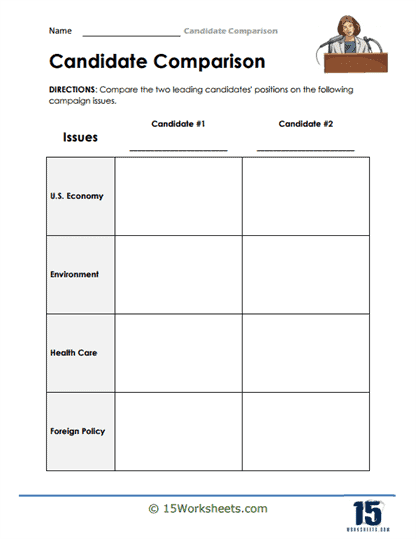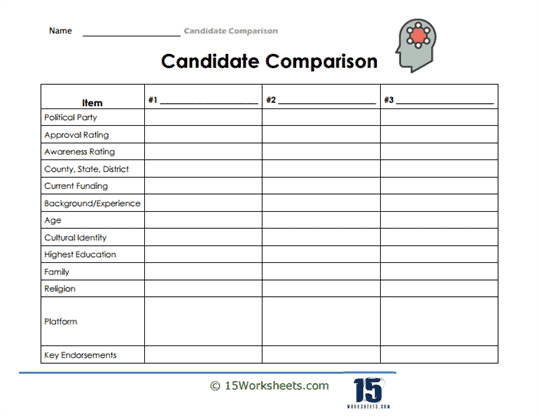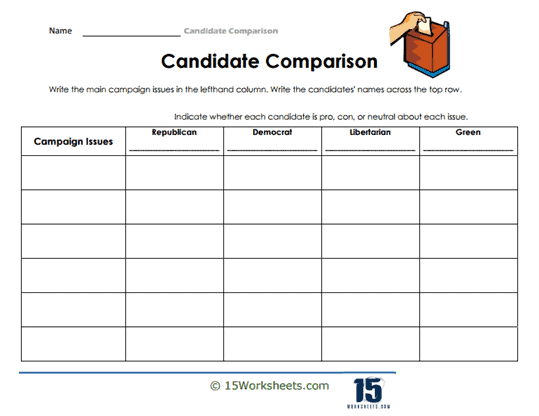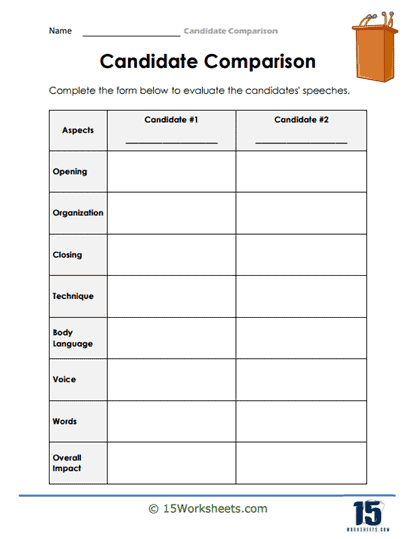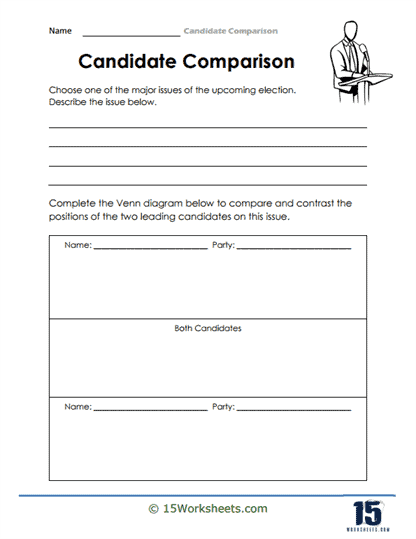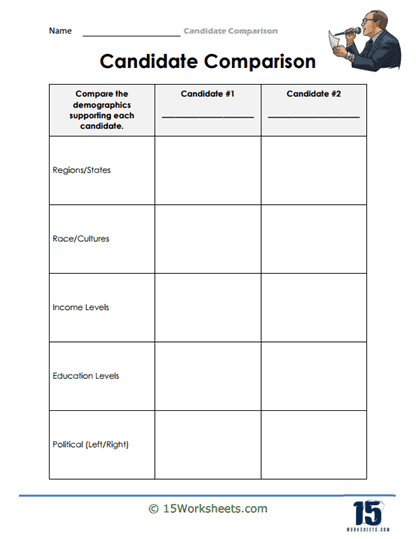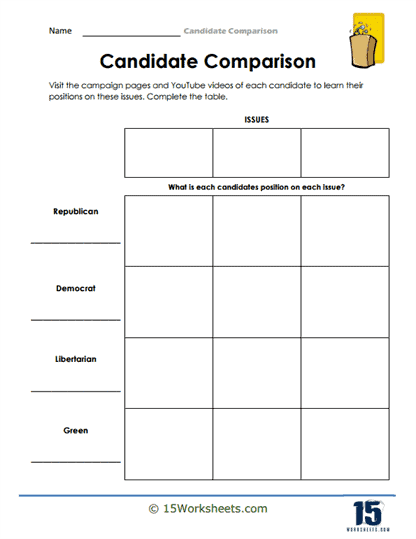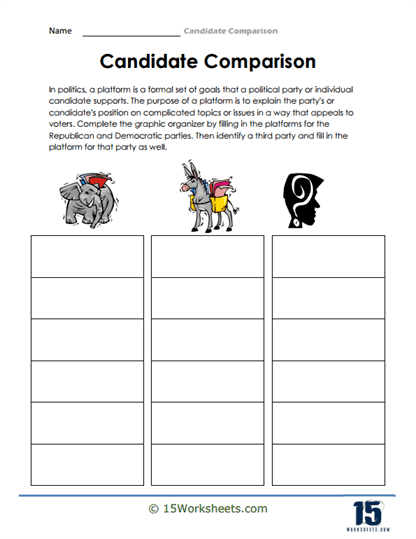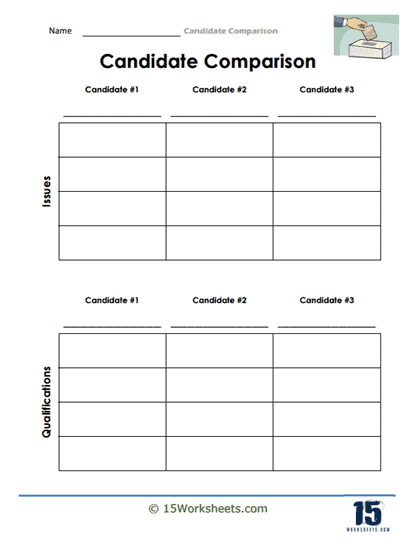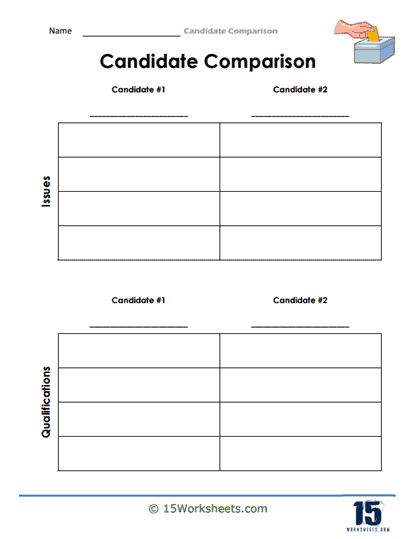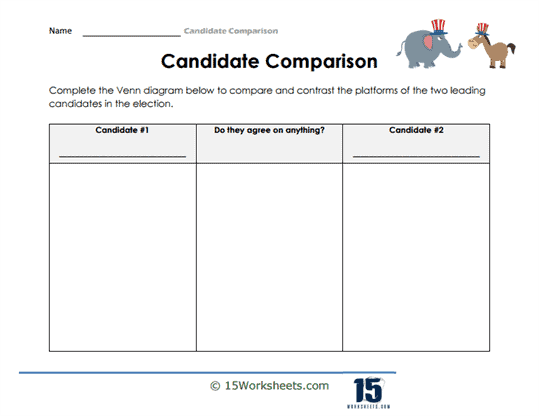Candidate Comparison Worksheets
All About These 15 Worksheets
Students go through a thought-provoking exploration of the political landscape with this comprehensive series of 15 worksheets on Candidate Comparison. This collection is designed to empower students with the knowledge and tools to critically evaluate political candidates, their platforms, and their qualifications. Through a series of engaging activities and exercises, students will develop a deeper understanding of the electoral process and gain the skills to compare and contrast candidates effectively. By completing these worksheets, students will:
- Explore the significance of informed decision-making, the role of candidates in the democratic process, and the value of comparing their qualifications and positions;
- Equip students with the skills to research candidates effectively;
- Evaluate the candidates’ communication skills, ability to articulate their positions, and the effectiveness of their arguments, fostering critical thinking and media literacy;
- And analyze the candidates’ backgrounds, experiences, qualifications, and positions on key issues, facilitating a comprehensive comparison.
Utilizing this series of Candidate Comparison worksheets will empower students to navigate the complex world of politics and make informed decisions as responsible citizens. Through engaging activities and thought-provoking exercises, students will develop critical thinking skills, media literacy, and a deeper understanding of the electoral process. Overall, this series aims to foster active citizenship and encourage students to actively engage in the democratic process by evaluating candidates based on their qualifications, positions, and leadership qualities.
What is the Best Way to Compare Political Candidates?
As a voter, one of the most important responsibilities you have is to make informed choices when selecting political candidates during an election. The decision you make can significantly impact the direction of your community, state, or nation, shaping policies and decisions that affect various aspects of your life. To effectively compare political candidates, it is crucial to consider multiple factors, including their positions on key issues, voting records, qualifications, leadership qualities, and communication skills. This comprehensive guide offers a detailed look into the steps you should take to compare political candidates and make informed decisions at the polls.
Identifying Key Issues
The first step in comparing political candidates is to identify the issues that matter most to you. These issues may include topics such as healthcare, education, the economy, social justice, climate change, national security, or foreign policy. By focusing on the areas where you want the candidates to demonstrate their competence and commitment, you can concentrate your research efforts and more effectively compare their suitability for the position.
To identify key issues, consider the following:
- Reflect on your values, beliefs, and priorities.
- Think about the challenges facing your community, state, or country and which issues are most pressing or have the greatest potential impact.
- Listen to the concerns of friends, family, colleagues, or fellow community members to gain insight into the issues that affect them.
- Follow local, national, and international news to stay informed about current events and the pressing issues that may influence political decision-making.
Research Candidate Positions
Once you have identified the key issues, research each candidate’s stance on those issues. There are several ways to gather information about a candidate’s positions:
- Visit their official websites, where they often outline their policy proposals and provide details about their vision for the future.
- Read articles, op-eds, or interviews in which the candidate discusses their views.
- Watch speeches, town halls, or debates where the candidate speaks about their positions.
- Follow the candidate on social media platforms to stay updated on their opinions and policy announcements.
Keep in mind that a candidate’s position on an issue may evolve over time, so it is essential to consider how their views have changed and whether they have remained consistent in their beliefs.
Examining Voting Records
For candidates who have held public office, examining their voting records can provide valuable insight into their commitment to specific issues and their willingness to take a stand, even when it may not be politically expedient. Voting records can reveal how a candidate has approached crucial policy decisions and whether their actions align with their stated positions.
To examine a candidate’s voting record, consider the following resources:
- Official government websites that provide information about legislative votes and bill sponsorship.
- Non-profit organizations or advocacy groups that track politicians’ voting records on specific issues.
- News articles or analyses that discuss a candidate’s voting history and the implications of their decisions.
Assessing Qualifications
Evaluating each candidate’s qualifications is a critical step in comparing political candidates. Consider their education, professional experience, and political background, and assess whether their skills and expertise are relevant to the position they are seeking.

